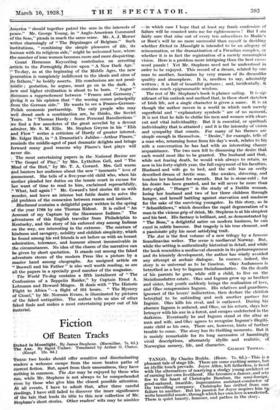Fiction
Off Beaten Tracks
THESE two books should offer sensitive and discriminating
readers a welcome escape from the more beaten paths of Current fiction. But, apart from their unusualness, they have nothing in common. The Axe may be enjoyed by those who run, while Mr. Stephens is not always to be comprehended even by those who give him the closest possible attention.
At all events, I have to admit that, after three careful readings, I have still failed to discover the inner significance of the tale that lends its title to this hew collection of Mr. Stephens's short stories. Other readers' wits may be nimbler —in which case I hope that at least my frank confession of failure will be counted unto me for righteousness ! But I am
fairly sure that nine out of every ten subscribes to Mudie's or Boot's will be no more successful than myself in deciding whether Etched in Moonlight is intended to be an allegory of reincarnation, or the dramatization of a Freudian complex, or whether it is in fact the registration of a merely meaningleki vision. Here is a problem more intriguing than the best cross, word puzzle ! Yet Mr. Stephens need not be understood in order to be enjoyed. This record of a dream, related by one Man to another, fascinates by very reason of its dreamlike quality and atmosphere. It is, needless to say, admirably
written ; it is full of beautiful pictures ; and, incidentally, it contains much epigrammatic wisdom.
The rest of Mr. Stephens's book is plainer sailing. It is sig. nificant of his outlook and method that, in these short sketches of Irish life, not a single character is given a name. It is a$ though the author moves in a world in which such merely superficial and " explanatory symbols " are of no moment, It is not that he fails to clothe his men and women with clear.
cut and vital individuality; But it is essential, or spirituar. individuality that is attained ; and it is the intensity of vision and sympathy that counts. For many of his themes are simple enough in themselves. " Desire," for example, tells of a man who, returning home from his day's work, relates to hiS wife a conversation he has had with an interesting chance acquaintance. The two men fell to discussing the desire that each would most like to be granted. The husband said that, while not fearing death, he would wish always to retain, as now in his forty-eighth year, the full enjoyment of his faculties, Husband and wife go to bed, and the wife has an eerily described dream of Arctic seas. She awakes, shivering, and touches her husband for warmth. But he is stone-cold ; for his desire has been granted, and he will never be more than forty-eight. " Hunger " is the study of a Dublin woman, losing her : husband and two of her three children through hunger, and herself battling against starvation and madness for the sake of the surviving youngster. In this story, as M " Schoolfellows," which describes the rapid degeneration of is man in the vicious grip of drink, Mr. Stephens is at his simplest and his best. His fantasy is brilliant, and, as demonstrated by " The Boss," a delightful satire on modern business, he can excel in subtle humour. But tragedy is his true element, and a passionate pity his most satisfying trait.
The Axe is:the first volume of a new trilogy by a famous ScamrufaVian writer. The scene is mediaeval Norway. But, while the:setting is authentically historical in detail, and while the book resembles a mediaeval chronicle in its picturesqueness and its leisurely development, the author has wisely avoided . any attempt at archaic dialogue. In essence, indeed, the story is so universal as to be timeless. Olav Audunason is betrothed as a boy to Ingunn Steinfinnsdatter. On the death of his parents he goes, while still a child, to live on the Steinfinnsdatter estate. Olav and Ingunn grow up as brother and 'sister, but youth' suddenly brings the realization of love, and (Nay edinpromises Ingunn. His relatives and guardians; ignorant' Of the loVers' indiSeretien, then declare the childish betrothal; to be unbinding and seek another partner for Ingunn: Olav kills his rival, and is outlawed. During his
ibsenCe Ingtuin is seduced, and Olav; on his return, slays her-, betrayer with his axe in a forest, and escapes undetected in the darkitese. Eventually he and Ingunn stand at the altar as
_ _ man and wife, and Olav agrees to recognize Ingunn's
Mate child as his own. There are, however, hints of further trouble to come. The story has its thrilling moments. But it is mainly remarkable for its long succession of hauntingly, vivid. descriptions, alternately idyllic and realistic, of
Norwegian scenery, life, and Character. GILBERT THOMAS.
TANGO. By Charles Rodda. (Bean. 7s. 6d.)—This is a pleasant tale of stage life. There are some exciting scenes, but an idyllic touch prevails. Joyce Allen, left fatherless, is faced with the alternatives of marrying a stodgy young architect or of earning her own livelihood. She becomes a dancer, and sets fire to the heart of Cbristophe Baraban, the semi-foreigri, good-natured, irascible, impecunious assistant-conductor of the travelling company. Christophe has drifted from one failure to another. But his passion for Joyce inspires him t4( write beautiful music, through which her own love is awakene& There is quiet beauty, humour, and pathos in the story.


























































 Previous page
Previous page